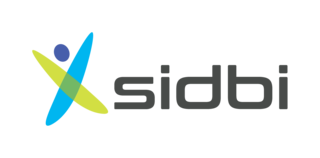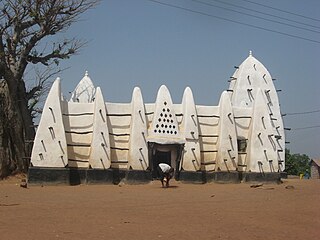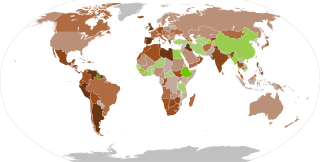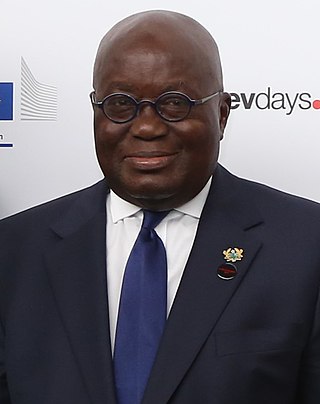Related Research Articles

Small Industries Development Bank of India (SIDBI) is the apex regulatory body for overall licensing and regulation of micro, small and medium enterprise finance companies in India. It is under the jurisdiction of Ministry of Finance, Government of India headquartered at Lucknow and having its offices all over the country.The SIDBI was established on April 2, 1990, by Government of India, as a wholly owned subsidiary of IDBI Bank. It was delinked from IDBI w.e.f. March 27, 2000. Its purpose is to provide refinance facilities to banks and financial institutions and engage in term lending and working capital finance to industries, and serves as the principal financial institution in the Micro, Small and Medium Enterprises (MSME) sector. SIDBI also coordinates the functions of institutions engaged in similar activities. It was established in 1990, through an Act of Parliament.

The Ghana Revenue Authority (GRA) is the Ghana administration charged with the task of assessing, collecting and accounting for tax revenue in Ghana.

Rebecca Naa Okaikor Akufo-Addo is a Ghanaian public figure and the current first lady of Ghana as the wife of President Nana Akufo-Addo.
Prime Minister's Youth Programme is an initiative by the former prime minister of Pakistan Nawaz Sharif established in 2013. The purpose of the programme is to ensure the provision of quality education, and meaningful employment to the youth through integrated, sustainable youth initiatives. The programme provided government-subsidised business loans of up to 25 million rupees, under three tiers: first-tier for 10000 to 1 million, the second tier for 1 million to 10 million, and the third tier for 10 million to 25 million. The programme also provided a skills scholarship program, a talent hunt for youth sports, and a national youth council.

Kwaku Agyemang-Manu a Ghanaian politician. He is the Member of Parliament for Dormaa Central and the Minister of Health. He is a Chartered Management Accountant and obtained a Bachelor of Arts in Economics and Statistics from the University of Ghana in 1989.

The Savannah Region is one of the newest regions of Ghana and yet the largest region in the country. The creation of the Region follows presentation of a petition by the Gonja Traditional Council, led by the Yagbonwura Tumtumba Boresa Jakpa I. Upon receiving favourable responses from all stakeholders in the Northern Region, the Brobbey Commission, a referendum was conducted on the 27th December 2018. The result was a resounding yes of 99.7%. The President of the Republic of Ghana signed and presented the Constitutional Instrument (CI) 115 to the Yagbonwura in the Jubilee House, Accra on 12 February 2019. The launch was well attended by sons and daughters of Gonjaland including all current and past Mps, MDCEs and all appointees with Gonjaland descent. Damongo was declared the capital of the new Savannah Region. It is located in the north of the country. The Savannah Region is divided into 7 districts; Bole, Central Gonja, North Gonja, East Gonja, Sawla/Tuna/Kalba, West Gonja, North East Gonja and 7 Constituencies; Bole/Bamboi, Damongo, Daboya/Mankarigu, Salaga North, Salaga South, Sawla/Tuna/Kalba and Yapei/Kusawgu. The capital of Bole district is Bole; East Gonja municipal is Salaga; West Gonja district is Damango; Sawla Tuna Kalba district is Salwa; Central Gonja is Buipe; North Gonja is Daboya; and North East Gonja is Kpalbe

The COVID-19 pandemic in Ghana was a part of the worldwide pandemic of coronavirus disease 2019 caused by severe acute respiratory syndrome coronavirus 2. The first two cases in Ghana were confirmed on 12 March 2020, when two infected people came to Ghana, one from Norway and the other from Turkey.

The economic impact of the COVID-19 pandemic in India has been largely disruptive. India's growth in the fourth quarter of the fiscal year 2020 went down to 3.1% according to the Ministry of Statistics. The Chief Economic Adviser to the Government of India said that this drop is mainly due to the coronavirus pandemic effect on the Indian economy. Notably, India had also been witnessing a pre-pandemic slowdown, and according to the World Bank, the current pandemic has "magnified pre-existing risks to India's economic outlook".

The Veronica bucket is a mechanism for hand washing originating in Ghana which consists of a bucket of water with a tap fixed at the bottom, mounted at hand height, and a bowl at the bottom to collect waste water. The Veronica bucket was developed by Veronica Bekoe. The Veronica bucket serves as a simple way to encourage proper hand washing using flowing water. Bekoe in an interview stated that the bucket was originally made to help her and her colleagues wash their hands under running water after each lab session. She said, "We are used to washing hands in a bowl with others washing in the same water, which will do more harm than good." These colleagues were contaminating their hands rather than decontaminating them. In addition to the COVID benefit of hand washing, the Veronica bucket is also essential for areas where potable water is not readily available.
The Emergency Measures in the Public Interest (COVID-19) Act 2020 was an Act of the Oireachtas which provided for additional powers for the state in the extraordinary circumstances of the spread of the COVID-19 pandemic.
Ekumfi Fruits and Juices Limited is a Ghanaian fruit juice company which specializes in the manufacturing of locally made fruit juices from the Ekumfi Abor district in the Central Region of Ghana. The organisation was born as part of the government's flagship programme One district, one factory (1D1F) initiative in 2019.
The Ghana Enterprises Agency (GEA) is a Ghanaian government agency under the Ministry of Trade and Industry. The GEA is mandated by the Ghana Enterprises Agency Act, 2020 to promote and develop MSMEs in Ghana. It replaced the National Board for Small-Scale Industries (NBSSI).

The Government of Ghana initially responded to the virus through a nationwide disinfection and fumigation exercise which began in April 2020. In order to curb the spread of the virus, the government enforced lockdowns, aggressive contact tracing, public bans and social measures such as encouraging the wearing of face masks. By April, it began the gradual reopening of the country; lifting all lockdowns while maintaining protocols such as social distancing. Throughout the pandemic, the government partnered with the private sector in order to roll out economic reliefs and recovery programs as a result of the impact of the pandemic on Ghana's economy. There was also an expansion of medical facilities and the improvement of testing logistics.
On 5 January 2020, the World Health Organization (WHO) notified the world about "pneumonia of unknown cause" in China and subsequently followed up with investigating the disease. On 20 January, the WHO confirmed human-to-human transmission of the disease. On 30 January, the WHO declared the outbreak a Public Health Emergency of International Concern and warned all countries to prepare. On 11 March, the WHO said that the outbreak constituted a pandemic. By 5 October the same year, the WHO estimated that a tenth of the world's population had been infected with the novel virus.

Africa's first confirmed case of COVID-19 was announced in Egypt on 14 February 2020. Many preventive measures have been implemented in different countries in Africa, including travel restrictions, flight cancellations, event cancellations, school closures, and border closures. Other measures to contain and limit the spread of the virus has included curfews, lockdowns, and enforcing the wearing of face masks. The virus has spread throughout the continent. Lesotho, the last African sovereign state to have remained free of the virus, reported a case on 13 May 2020.
Ghana COVID-19 Alleviation and Revitalisation of Enterprises Support was launched by Nana Akufo-Addo on 18 November 2020 in Accra. Some source also claimed it was launched by Yaw Osafo-Maafo. The program is in two phases. It is also known as "Obaatan Pa”. The program is claimed to serve as a 'blueprint' for Ghana's economy recovery post COVID-19. According to Osei Kyei Mensah Bonsu, the Ghana CARES program 'is the boldest and biggest economic recovery program in the country's history, will enable the country to turn the challenges created by COVID-19 into opportunities for socioeconomic transformation'.

The presidency of Nana Akufo-Addo began on 7 January 2017. Following the 2016 Ghanaian general elections, Nana Akufo-Addo the flag-bearer of the New Patriotic Party, succeeded John Mahama as the 5th President of the Ghanaian Fourth Republic after winning by a landslide. He won a second term on 9 December 2020 in a tightly contested race against National Democratic Congress (NDC) candidate and former president, John Mahama.

Most governments decided to temporarily close educational institutions in an attempt to reduce the spread of COVID-19. As of 12 January 2021, approximately 825 million learners are affected due to school closures in response to the pandemic. According to UNICEF monitoring, 23 countries are implementing nationwide closures and 40 are implementing local closures, impacting about 47 percent of the world's student population. 112 countries' schools are open.
The following is a timeline of the COVID-19 pandemic in Ghana from August 2020 to December 2020.
References
- ↑ Donkor, Jonathan (2020-06-10). "Ghana: 170,000 MSMEs Apply for COVID-19 Business Support Scheme - NBSSI". allAfrica.com. Retrieved 2020-08-27.
- ↑ "Coronavirus Alleviation Programme Business Support Scheme (CAP BuSS): Win-Win for All!". MyJoyOnline.com. 2020-05-29. Retrieved 2020-08-27.
- ↑ "170,000 MSMEs apply for COVID-19 business support scheme- NBSSI". Ghanaian Times. 2020-06-10. Retrieved 2020-08-27.
- ↑ "IIA - Invest In Africa : Prospering African Economies". investinafrica.com. Archived from the original on 2020-10-06. Retrieved 2020-08-27.
- ↑ "Ghana Can Dream Again – Coronavirus Alleviation Programme Business Support Scheme: Win-Win For All!". www.msn.com. Retrieved 2020-08-27.
- ↑ "COVID-19 Alleviation Programme: 8,000 apply for loan". Graphic Online. Retrieved 2020-08-27.
- ↑ "NBSSI detects 5,200 fraud alerts on Coronavirus Alleviation Programme". www.ghanaweb.com. 2020-06-22. Retrieved 2020-08-27.
- ↑ Bureau, Communications (19 May 2020). "President Akufo-Addo Launches Gh¢1 Billion Cap Business Support Scheme". presidency.gov.gh. Retrieved 2020-08-27.
- ↑ "CAPBuSS disbursement ends January 31". www.ghanaweb.com. 2021-01-30. Retrieved 2021-01-30.
- ↑
- ↑ "NBSSI disburses GHC1m to micro business owners". BusinessGhana. Retrieved 2020-08-27.
- ↑ "21,892 jobs created in three and half years – NBSSI". www.ghanaweb.com. 2020-10-03. Retrieved 2020-10-05.
- ↑ "Coronavirus: 110,000 women-owned businesses get support". www.ghanaweb.com. 2020-10-05. Retrieved 2020-10-05.
- ↑ "Govt unveils GH¢2 billion credit guarantee scheme for SMEs". www.ghanaweb.com. 2020-10-18. Retrieved 2020-10-18.
- ↑ "Disbursement of GH¢50 million stimulus to private schools approved – NBSSI". www.ghanaweb.com. 2020-09-14. Retrieved 2020-09-15.
- ↑ "NBSSI launches business support programme". Graphic Online. Retrieved 2020-09-17.
- ↑ "8000 applications for first day of launch". graphic online. Retrieved 2023-07-31.
- ↑ "7% of PWDs benefit from CAP". ghana business news. 20 December 2020. Retrieved 2023-08-01.
- ↑ "MSMEs in North East Gonja never benefited from COVID-19 support". Ghana business news. 27 January 2022. Retrieved 2023-08-01.